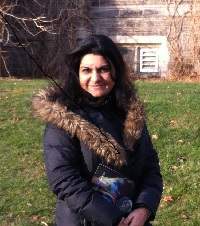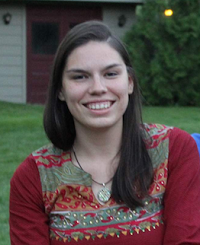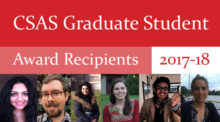The Centre for South Asian Studies is pleased to announce the recipients of this year’s graduate awards. Congratulations to the following students.
DILJIT AND GULSHAN JUNEJA AWARD FOR SOUTH ASIAN STUDIES
 Tamara Cohen
Tamara Cohen
PhD Candidate, Department for the Study of Religion, Collaborative Specialization in South Asian Studies
Tamara is working on the first comprehensive interpretive reading of the nearly complete critical edition of the Mokṣopāya, the 10th C Kashmiri recension of a text popularly known in its later recension as the Yogavāsiṣṭha (11-14th C). The Mokṣopāya is the earliest Hindu text that uses the term haṭhayoga as a form of praxis that leads to liberation and is therefore an important early haṭhayoga text that has been largely overlooked by scholars seeking to clarify the textual origins of the HY tradition. The haṭhayoga material of the Mokṣopāya contains previously unknown and uncommon theories of prāṇāyāma, āsana, siddhis, cakra, kuṇḍalinī, nāḍī, bhūmi, as well as a unique, nondual rendering of classical Yoga philosophy. Working directly with scholars of the Mokṣopāya project in Marburg and Halle, Germany, Tamara’s work seeks to compare and identify the particular constellation of elements that make up the yogic body described in the Mokṣopāya within the yoga and tantra text traditions of the time to better shed light on the historical context of the Mokṣopāya as the earliest extant record of haṭhayoga praxis.
INDIA-CANADA ASSOCIATION SCHOLARSHIP
 Anwesha Ghosh
Anwesha Ghosh
PhD Candidate, Department of History, Collaborative Specialization in South Asian Studies
Anwesha’s dissertation is tentatively titled Making of Colonial Calcutta: A Study in the Art of Municipal Governance. In this work, Anwesha carefully reconstructs the history of nineteenth century Calcutta through the lens of the municipality – a key site for understanding technologies of colonial governmentality, that is technologies of political economy that map markets as the foundation for modern and efficient governing. It builds on a range of recent research that maps colonial economic governing and introduces to this historiography a new focus on the city and municipality.
 Aakash Solanki
Aakash Solanki
First Year Doctoral Student, Department of Anthropology, Collaborative Specialization in South Asian Studies
Aakash Solanki is interested in the anthropological study of states, statistics, and computing in India. His research specifically looks at the appropriation of machine learning algorithms and Big Data technologies in everyday governance in India. Aakash’s past research has explored the politics of information collection, management, classification, and its consequences in colonial India. Before moving to Toronto, Aakash worked in various capacities at the federal and state government level in India and at the city level in the United States on electronic governance projects. Aakash has a Bachelor of Technology degree in Information & Communication Technology from the Dhirubhai Ambani Institute, India, and a Master of Arts degree in Social Sciences from the University of Chicago. Aakash coordinates the Development Seminar, an interdisciplinary workshop series, at the University of Toronto. Twitter: @skishchampi
Laura Valencia
MA student, Department of Geography and Planning
For her MA thesis in Human Geography, Laura studying the social implications of forest landscape restoration in India. India’s compensatory afforestation policy requires mining and infrastructure projects to offset deforestation by planting “compensatory” trees. The scale of this initiative is huge: over $7 billion USD of offset payments have accumulated with the Compensatory Afforestation Management and Planning Fund, which local forest departments will use to acquire thousands of hectares of “wasteland” and “degraded land” for tree plantation. Civil society actors have questioned whether industrial plantations can compensate for forests, and point out that rampant deforestation continues unchecked. Moreover, allocating land used as commons for plantations can have negative social impacts. In the era of climate change, forest restoration is a genuine concern, so my research will also explore alternative, community-rooted efforts to green India as counterpoints to state-led efforts. This award will support fieldwork in Odisha, India, starting
in September, 2018.
INDIA’S 50TH ANNIVERSARY GRADUATE STUDENT PRIZE
 Aarzoo Singh
Aarzoo Singh
Fourth Year Doctoral Candidate, Women and Gender Studies Institute
The ways in which official histories – particularly that of colonial histories – have been documented, understood, and accepted as factual accounts limits the nuanced understanding of experiences had by displaced colonized communities. My intervention to this dilemma comes through physical objects and heirlooms that, I propose, carry meaning and memories, which contribute to the intergenerational linkages among colonial and postcolonial subjects. As a member of the South Asian diaspora, whose familial history is wrapped within the colonial narrative of India, I have found that feelings of “home” and belonging can be incited and provoked through the passing down of objects and the narratives attached to them. How these emotional locations are represented has contributed to my interest in exploring what I am calling affective objects: sites, things, heirlooms, and artefacts that, because they are intimately linked to familial and community history, are laden with emotions or feelings. More specifically, I suggest that the entwining of discourses of identity, race, nation, home, and community – as understood alongside South Asian diasporic exile and displacement – are discourses that not only inform, but emerge from, moveable objects. Through the study of personal narratives that attach themselves to moveable objects, which are often disregarded as “unreliable” facts, my research opens academic discourse to exploring alternative epistemological avenues and sites of knowledge production that is beyond the traditionally accepted text.
SANDHYA AND RITTEN RAY AWARD FOR INDIAN PHILOSOPHY AND RELIGION

Andrew Dicks
Doctoral Student, Department for the Study of Religion, Ho Centre for Buddhist Studies
In my research, I am examining the relationships, practices, and infrastructures that have shaped, and continue to shape, the production, as well as the reception, of Myanmar/Burma’s Buddhist soundscape. More specifically, amplified and live recitations of a popular, yet highly scholastic, Buddhist philosophical treatise (Paṭṭhāna, Conditional Relations), garner significant support as a part of the defensive religious practices of this modern Buddhist nation state. For Burmese Buddhists, the Paṭṭhāna methodically demonstrates the Buddha’s omniscience, charting critical ethical formulas, while occupying the most precarious position in the Pali canon. The reception of this twenty-four hours a day, weeklong amplified recitation ceremony is contested and exists within larger fields of impugned soundscapes, religious and secular. However, the Buddhist aural projection remains privileged through its continued patronage and protection by the majority of state and non-state enterprises and actors.
